Yale’s existing residential colleges sustain close-knit communities within the larger University. Students know each other by name, and they know senior faculty—a tradition that will continue in the new facilities.
The residential college model
-
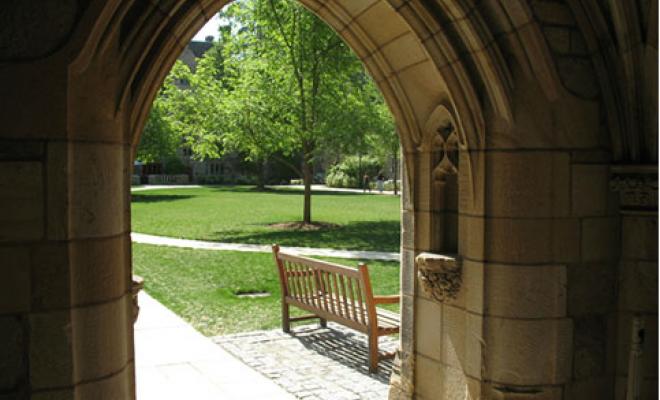 In 1933, Yale inaugurated its residential college system. Designed to support small communities of students and faculty, the colleges are central to life and study as a Yale undergraduate.
In 1933, Yale inaugurated its residential college system. Designed to support small communities of students and faculty, the colleges are central to life and study as a Yale undergraduate. -
 Distinctive in design and character, the twelve colleges showcase a variety of architectural styles, from neo-gothic to modern. But all share a common scheme in the type and arrangement of spaces open to students.
Distinctive in design and character, the twelve colleges showcase a variety of architectural styles, from neo-gothic to modern. But all share a common scheme in the type and arrangement of spaces open to students. -
 The life of a college emanates from the master's house, which is both a private residence and a community gathering space. Weekly master's teas bring distinguished visitors to campus, including leaders from business, government, and entertainment.
The life of a college emanates from the master's house, which is both a private residence and a community gathering space. Weekly master's teas bring distinguished visitors to campus, including leaders from business, government, and entertainment. -
 A suite of offices for the master and the resident dean make up the operational center of the college. These senior faculty members figure in the students' social and academic life, providing informal guidance and academic advising.
A suite of offices for the master and the resident dean make up the operational center of the college. These senior faculty members figure in the students' social and academic life, providing informal guidance and academic advising. -
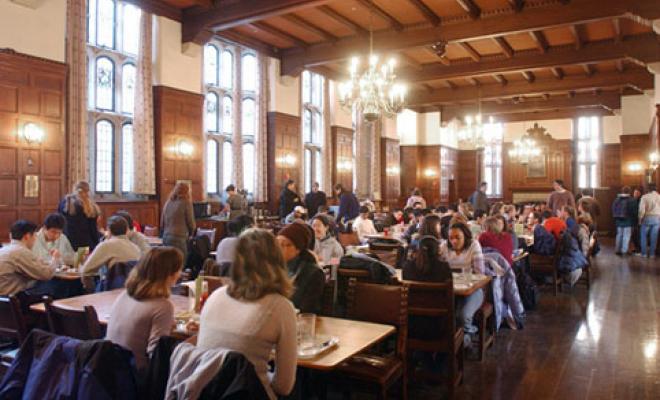 The dining hall, where students and faculty share breakfast, lunch, and dinner, is a hub of social life in a residential college. These spacious and elegant facilities also host formal gatherings.
The dining hall, where students and faculty share breakfast, lunch, and dinner, is a hub of social life in a residential college. These spacious and elegant facilities also host formal gatherings. -
 Students select from a variety of meals, including a complete menu of sustainable foods, in the servery.
Students select from a variety of meals, including a complete menu of sustainable foods, in the servery. -
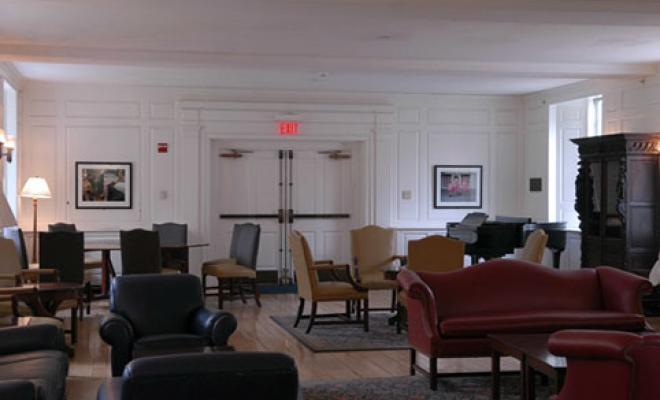 In every residential college, a comfortably appointed common room brings students and faculty together.
In every residential college, a comfortably appointed common room brings students and faculty together. -
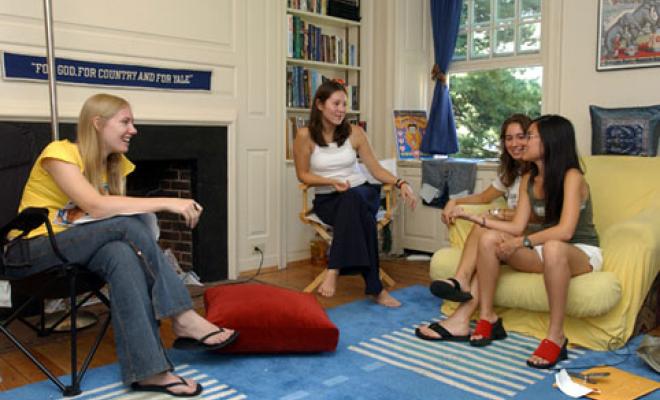 Student suites are organized around an entryway system rather than hallways. A typical suite includes a common room and two to four bedrooms.
Student suites are organized around an entryway system rather than hallways. A typical suite includes a common room and two to four bedrooms. -
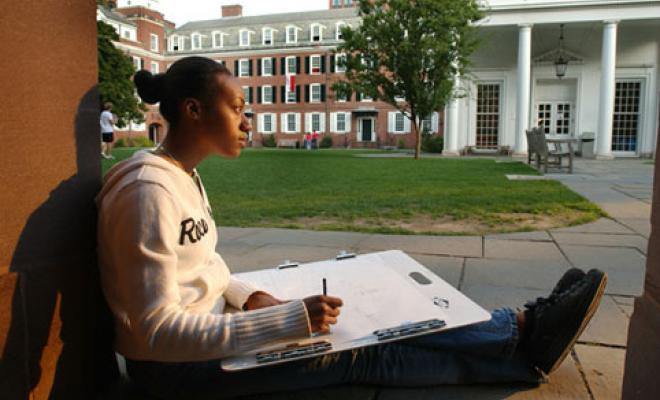 Entryways open onto landscaped courtyards. Each of these gated courts is a unique haven for students, ideally suited for leisure and quiet study.
Entryways open onto landscaped courtyards. Each of these gated courts is a unique haven for students, ideally suited for leisure and quiet study. -
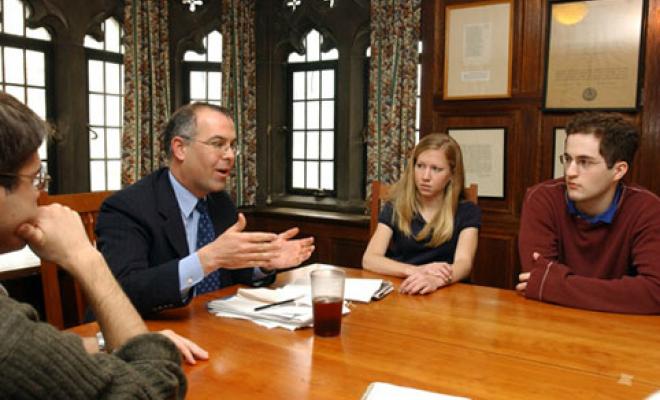 The residential colleges have strong ties to the academic programs of Yale College. The dean is responsible for academic advising, and students participate in an active program of residential college seminars taught by distinguished faculty and visitors.
The residential colleges have strong ties to the academic programs of Yale College. The dean is responsible for academic advising, and students participate in an active program of residential college seminars taught by distinguished faculty and visitors. -
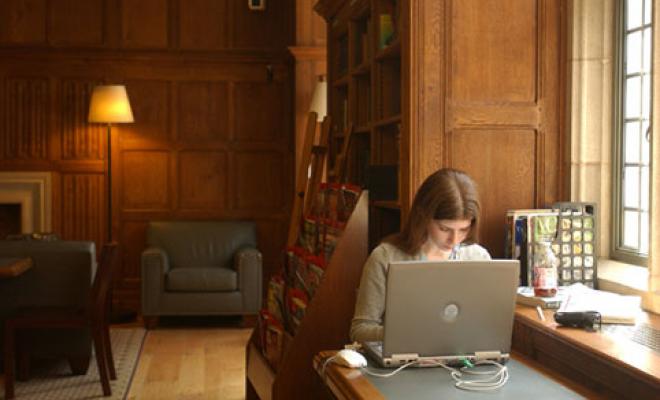 The residential college library is a place for individual or group study. Each college library is equipped with wireless Internet access, as well as hardwired terminals.
The residential college library is a place for individual or group study. Each college library is equipped with wireless Internet access, as well as hardwired terminals. -
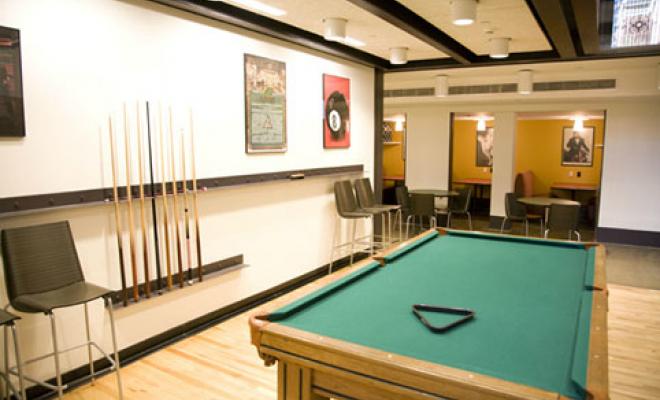 Activity rooms in each college support a range of extracurricular pursuits, from art to theater. The café and game room support recreation after hours.
Activity rooms in each college support a range of extracurricular pursuits, from art to theater. The café and game room support recreation after hours. -
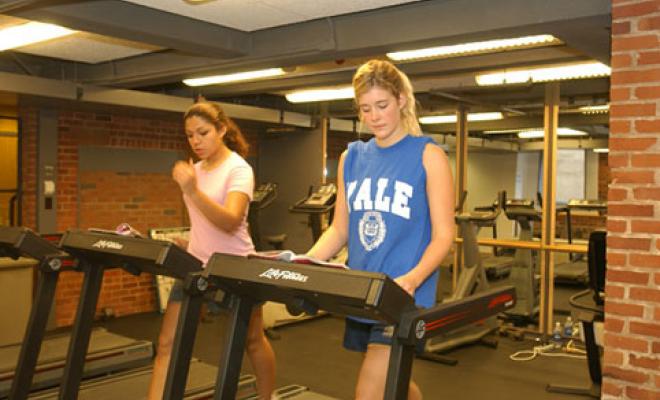 The gym is a popular site for students, equipped for both cardiovascular exercise and weight training.
The gym is a popular site for students, equipped for both cardiovascular exercise and weight training. -
 Every residential college places a high value on space that supports student art. Facilities including darkrooms, pottery studios, galleries, and music practice rooms are in high demand. In the past decade, an ongoing renovation program has introduced high-quality performance spaces into the residential colleges, including fully equipped theaters and dance studios.
Every residential college places a high value on space that supports student art. Facilities including darkrooms, pottery studios, galleries, and music practice rooms are in high demand. In the past decade, an ongoing renovation program has introduced high-quality performance spaces into the residential colleges, including fully equipped theaters and dance studios. -
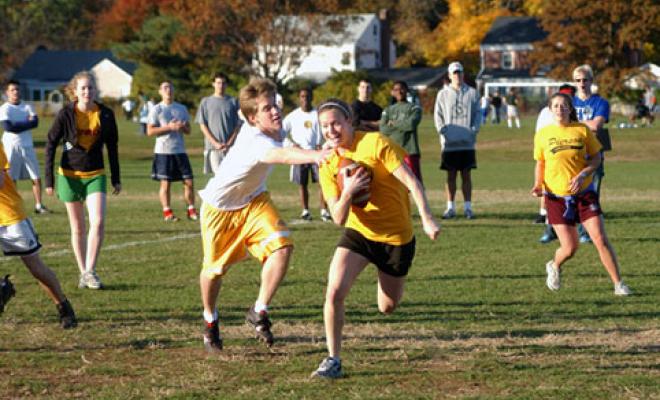 More than 50 percent of undergraduates participate in intramural sports. Football, volleyball, table tennis, soccer, squash, and more—these popular activities are an opportunity for students to make long-lasting friendships. The Tyng Cup is presented annually to the college with the highest overall performance.
More than 50 percent of undergraduates participate in intramural sports. Football, volleyball, table tennis, soccer, squash, and more—these popular activities are an opportunity for students to make long-lasting friendships. The Tyng Cup is presented annually to the college with the highest overall performance. -
 Identification with one's residential college is a deep-seated tradition. At football games, for example, students frequently gather under their college's banner and shout their own cheers in support of the Bulldogs.
Identification with one's residential college is a deep-seated tradition. At football games, for example, students frequently gather under their college's banner and shout their own cheers in support of the Bulldogs. -
 Identification with one's residential college is a deep-seated tradition. At football games, for example, students frequently gather under their college's banner and shout their own cheers in support of the Bulldogs.
Identification with one's residential college is a deep-seated tradition. At football games, for example, students frequently gather under their college's banner and shout their own cheers in support of the Bulldogs.